Bucking the trend to solve the North Korean nuclear issue
By Lee Kyung-sik
Publisher of The Korea Post
What would President Kim Jong-un of North Korea say if hypothetically Presidents Park Geun-hye, Barack Obama and Xi Jinping would propose a four-party summit meeting with President Kim Jong-un of North Korea to save the obviously worsening situation on the Korean peninsula?
When everything fails, one sometimes tries to buck the trend with an ‘impossible’ alternative. Who knows? Kim might come right out and say, “Why, that sounds a great idea! Why don’t we do it!”
The Korean people have a wise-saying, “When a rat is driven to a dead end, it will attack the cat.” Everyone knows that a rat is no match for a cat as it is just a prey animal to it, but when it comes to the life-and-death situation the rat will attack back. The rat, of course, will be killed by the cat on the spot, but still it can do some harm to the cat although it will be minimal.
It appears that this is what China has in mind although she does not openly say so out of respect for the reputation of North Korea as well as its relations with it.

It appears that this is why China is opposed to excessive international sanctions against North Korea, although it agrees with the Republic of Korea, the United States and many other countries that North Korea should be discouraged against nuke testing and missile-launching.
However, a closer look into the situation in North Korea, especially into Chairman Kim Jong-Un who runs the country ‘with a gun in hand,’ shows that it is getting more and more out of the hands.
It appears that Kim Jong-Un does not listen even to China as much as his father and grandfather did in the past and in this situation China appears to have a much limited room of choice compared with the former North Korean leaders, Kim Jong-il and Kim Il-sung.
The way President Xi Jinping treated President Park Geun-hye during her visit to China and his visit to Korea, there is no doubt that Xi is the most ‘pro-South Korean’ Chinese leader compared with all his predecessors and the way he speaks and acts he appears to have genuine interest in the promotion relations and friendship between South Korea and China.
At this juncture, it appears that it might be a good idea for President Park Geun-hye to have a big heart and propose a four-party talks among South Korea, the US, China and North Korea to try to solve the inter-Korean issue with an open mind.
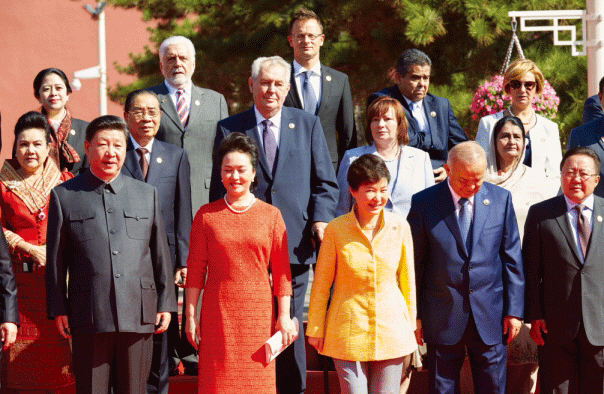
China has a good measure of leverage on North Korea, which other countries do not have, especially the oil. Some even predict that the North Korean army tanks and motor vehicles would not be able to move within a matter of days if China completely cuts off its supply of oil to the North.
If China declares that it will cut off its oil supply and all the other military assistance to North Korea and convinces Kim Jong-il that this time China really means that it will, many people believe that Kim Jong-un will then listen with a sincerely mind.
According to some Chinese reports published in Seoul (referred to the People’s Daily of China reported by YTN on Feb. 21, 2016), the North Korean regime will collapse within 30 minutes after the breakout of another war on the Korean peninsula. It said: “In time of a war between North Korea and the allied forces of South Korea and the United States, the North Korean regime will collapse within 30 minutes after the outbreak of the military conflict.
The US nuclear submarines will fire their Trident-5 missiles and they will literally wipe out the North Korean nuclear capabilities within 30 minutes after the start of the military conflict.
Quoting General James E. Cartwright, commander of the U.S. Strategic Command, the People’s Daily of China claimed that the initial pre-emptive US strike will fire a total of 8,000 missiles and precision-guided missiles at a rate of 10 against each target in North Korea.
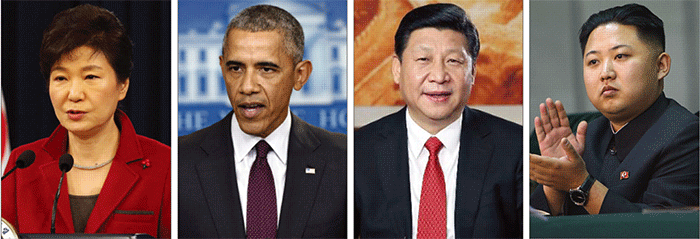
The late former President Kim Jong-Un, father of the incumbent President Kim Jong-un, destroyed the nuclear reactor tower in North Korea on June 27, 2008 based on an agreement reached at the Six-party Talks.
However, following the death of Kim Jong-Il on Dec. 17, 2011, his son, the incumbent President Kim Jong-un, declared to reconstruct the nuclear reactor in April 2, 2013, and resumed its operation.
It will pay for all the four parties to closely study the actual reasons as what caused Kim Jong-un to resume the nuclear weapons development and seek ways?be it whether it is a warlike nature he might have or his unnecessary fear of ‘the South’s annexation of the North.’
It might be interesting to review a news report of the CNN on June 27, 2008 covering the development concerning the demolition of the North Korean nuclear reactor.
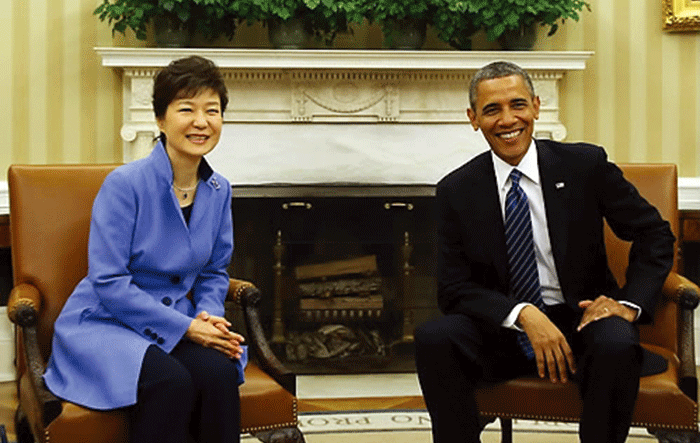
CNN report (June 27, 2008):
N. Korea destroys nuclear reactor tower
North Korea destroys a highly visible tower at a nuclear facility
U.S. President George Bush welcomes decision, warns North Korea still has work to do
Bush says he'll remove North Korea from list of state sponsors of terrorism
PYONGYANG, North Korea (CNN)--North Korea on Friday destroyed a water cooling tower at a facility where officials acknowledge they extracted plutonium to build nuclear weapons, CNN's Chief International Correspondent Christiane Amanpour reported from the scene.
The cooling tower is demolished at the Yongbyon nuclear complex near Pyongyang, North Korea.
The massive implosion, which came at about 5pm local time Friday at the Yongbyon facility, was intended to be a powerful public symbol of a move to end nuclear activities by the Communist nation once branded a member of an "axis of evil" by U.S. President George W. Bush.
The destruction of the highly visible symbol of North Korea's long-secret nuclear program came just a day after the country released details of its program.
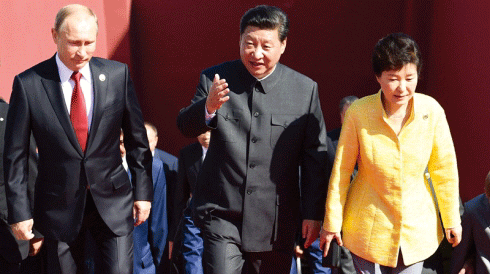
"They fired a warning flare and then in three minutes the whole thing came tumbling down in a massive cloud of smoke," Amanpour said.
"There was a moment of stunned silence as the magnitude of what had happened sunk in," Amanpour said.
U.S. State Department officials and observers from the International Atomic Energy Agency (IAEA) watched from a reviewing stand on a ridge about 1,000 yards away, she said.
"This is a very significant disablement step," the U.S. envoy to North Korea, Sung Kim, said.
Nuclear experts say that the plant's destroyed central water-cooling tower would take a year or longer to rebuild if North Korea were to try using the plant again.
"This is a critical piece of equipment for the nuclear reactor," said analyst John Wolfsthal, of the Center for Strategic and International Studies, who has been following North Korea since the 1980s. "Without this facility, the reactor can't operate and can't produce more plutonium for weapons."
North Korea has been dismantling other parts of the facility under the watchful eyes of representatives of the five other nations, including the U.S., that have been involved in six-party talks aimed at ending Pyongyang's nuclear weapons program.
On Thursday, North Korean officials turned over to China a 60-page declaration, written in English, that details several rounds of plutonium production at the Yongbyon plant dating back to 1986.
In it, North Korea acknowledges producing roughly 40 kilograms of enriched plutonium -- enough for about seven nuclear bombs, according to the U.S. State Department.
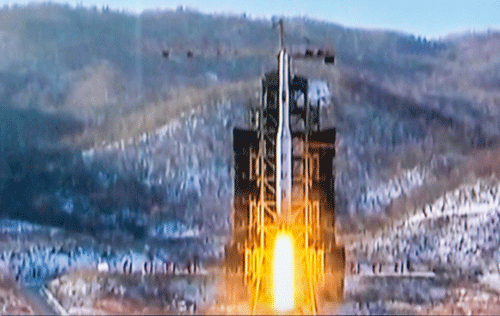
In response, Bush said he would lift some U.S. sanctions against North Korea and remove the country from the State Department's list of state sponsors of terrorism.
But he made clear that other sanctions remained in place on North Korea -- which has been on the terrorism list since its alleged involvement in the 1987 bombing of a South Korean airliner which killed 115 people.
"The United States has no illusions about the regime in Pyongyang," Bush said. "We remain deeply concerned about North Korea's human rights abuses, uranium enrichment activities, nuclear testing and proliferation, ballistic missile programs and the threat it continues to pose to South Korea and its neighbors."
U.S. analysts will pore over the document to resolve Washington's outstanding concerns, which include questions about the extent of North Korea's proliferation of nuclear technology and the status of any uranium enrichment program. Friday's event at the nuclear plant marked at least an effort by North Korea--dubbed "The Hermit Kingdom" in the international community for its isolationist tendencies--to show the world a good-faith effort to end its nuclear weapons program.

